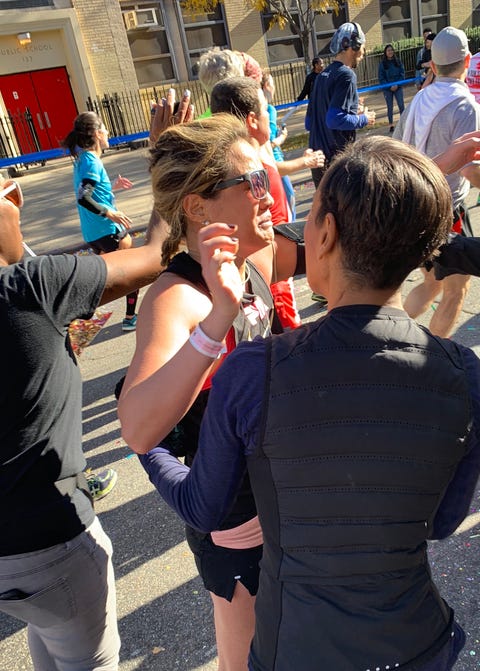Why Everyone Cries on Marathon Day—Whether You're Running or Watching

Hi, hello, I’m here with all the tissues to dry your 2018 NYC marathon tears! Whether you were running or watching, you weren’t the only one to feel extra emotional—and confused about why you felt like crying in the first place:
watching the marathon outside @ashtonevans’ house and a mom just saw her daughter pass and cheered and high fived her and they were both so happy and the look on the mom’s face after the girl passed WHY AM I CRYING OH GOD
Either im really emotional right now but im almost crying of inspiration from watching the people participating in the marathon today 😂
Nobody warned be that watching the marathon means crying all the tears. 😭
“Crying is a healthy emotional response to feeling sad, overwhelmed, or even happy,” says ultra-marathoner and three-time Ironman finisher Angie Fifer, PhD, a sports psychologist and executive board member of the Association for Applied Sport Psychology. She’s cried after her own races—”I was so happy to be able to stop moving after so many hours”—but also from the sidelines while watching others run.
The first scenario makes more sense: “Preparing for and finishing a marathon is an extensive process that affects so many different areas of your life, from sacrificing family and personal time, waking up and going to bed early, passing on fun social events, and even changes in nutrition and hydration,” she says. “The race itself is a culmination of all of those hours of training and sacrifice that build up to an intense emotional release.”
Seven-time marathoner Emily Abbate, 30, can relate: After the writer and creator of the podcast Hurdle ran her fastest 26.2 miles on Sunday, she erupted into tears:
“Crossing that finish line is so much more than just a single day of sustained effort,” Abbate says, remembering how far she’s come: In 2007, she struggled to run a single mile without wanting to throw up. “It’s a testimony to how dedication and hard work can help you achieve something great.”
Pia Tempongko, 36, who ran her third marathon on Sunday, succumbed to crying mid-race for a very different reason: Disappointment. She had to alternate between running, limping, and walking after knee issues—tracing back to the Berlin Marathon she ran in September—flared up around mile 11 on the NYC course. “I was in so much pain,” she says.

The thing is, her tears were nuanced: It wasn’t until mile 21, where she saw dense crowds cheering ahead of the finish line, that the flood gates broke and she began to “ugly cry,” as she describes it: “I was so overwhelmed with emotions,” she says. “They believed in me when I was doubting myself.”
And yet? Tempongko crossed the finish line in four hours and eight minutes.
Before you jump to conclusions, people who complete races dry-eyed aren’t big-headed or soulless: “Runners who don’t cry are no less invested, overwhelmed, or excited,” Fifer says. “They just didn’t have that particular emotional response.”
To that point: Some coaches actually encourage runners to put their feels aside while they compete. Jes Woods, a New York-based Nike+ Run Club coach and ultra-marathoner tells her runners to “bottle up all that energy and emotion and use it as fuel until the finish.”
But what about us non-runners?!
There are plenty of reasons why you might choke up like you can feel a runner’s pain even without even lacing up: “Watching others accomplish their goals or struggle through a challenging experience can also trigger an emotional response,” Fifer says—particularly if you someone you care about is pounding the pavement.
Meanwhile, crying for strangers can stem from deeper feelings: “Watching a race could also remind you that maybe you haven’t committed or followed through on a goal you want to pursue,” Fifer says. And then there’s running itself: “It’s such a beautiful sport, sometimes just watching the body in motion can be an emotional experience.”
Humans!
Follow Elizabeth on Instagram and Twitter.
Source: Read Full Article
